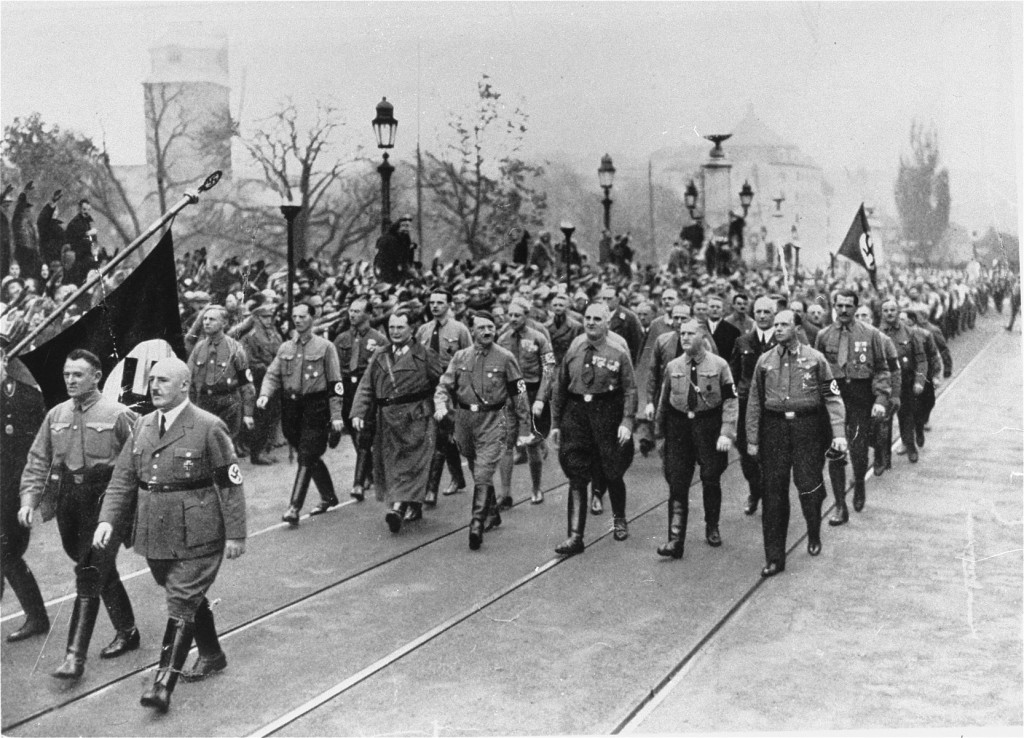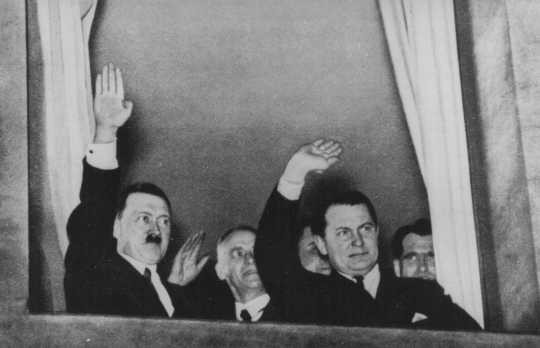
Hermann Göring: Key Dates
After Hitler's appointment as Chancellor of Germany in 1933, Hermann Göring took on many positions of power and leadership within the Nazi state. He was ultimately sentenced to death by the International Military Tribunal at Nuremberg. Learn more about key dates in Göring's life.
January 12, 1893
Hermann Göring is born in Rosenheim, in the German state of Bavaria.
1905–1911
Göring attends a military academy.
1915–1918
Göring serves in the German air force as a fighter pilot. Both wounded and decorated, by the end of the war, he is one of the best-known German air force war heroes.
Summer 1921
Göring begins university studies in history and political science in Munich.
November 1922
Göring meets Adolf Hitler at a Nazi Party rally and subsequently joins the Nazi Party.
November 9, 1923
Göring marches with Hitler during the Beer Hall Putsch against the German government. He is seriously wounded in the hip during the putsch.
1923–1927
Göring's wife, Carin, smuggles the wounded Göring out of Germany via Austria to Italy. In 1925, Göring and his wife go to Sweden to live with her family. After the German government declares a general amnesty for political refugees in 1927, Göring returns to Germany.
1928
Göring becomes one of 11 Nazis to obtain a parliamentary seat in the Reichstag (German parliament) after the Nazis receive 2.6% of the vote in the parliamentary elections.
September 1930
Hitler appoints Göring as his political representative in Berlin, choosing him to lead the Nazi Party Reichstag delegation.
October 1931
Göring's wife, Carin, dies of a heart attack.
July 1932
Göring becomes president of the Reichstag after the second Nazi electoral surge makes the Nazi Party the largest party in the German parliament.

January 1933
The Nazis obtain control of the German state with the appointment of Adolf Hitler as Chancellor.
Göring receives a cabinet post (Minister without Portfolio) in the Nazi-Nationalist coalition government. Göring is also appointed acting commissar for the Prussian Ministry of the Interior.
February 1933
Göring authorizes the appointment of SA (Sturmabteilung; Storm Troopers) and SS (Schutzstaffel; Protection Squadron) personnel as auxiliary police personnel.
April 11, 1933
Göring persuades Hitler to confirm him as permanent Minister President and Minister of the Interior of Prussia.
April 26, 1933
Göring announces the formation of the Office of the Secret State Police (Geheime Staatspolizeiamt). This office eventually becomes the Gestapo (Geheime Staatspolizei; Secret State Police).
May 5, 1933
Hitler appoints Göring Reich Minister for Aviation.
April 1934
Göring negotiates an alliance with Reichsführer-SS (SS chief) Heinrich Himmler. Göring gives up control over the Gestapo and supports SS independence from the SA in July 1934, in return for SS help in removing SA chief of staff Ernst Röhm.
May 1934
The Prussian Ministry of the Interior is incorporated into the Reich Ministry of the Interior.
December 1934
A secret Hitler decree secures Göring's position as successor to Hitler in the event of Hitler's death or inability to carry out his duties.
March 1935
Göring becomes commander-in-chief of the new German Air Force (Luftwaffe). Göring holds this position until April 29, 1945.
April 10, 1935
Göring marries the theater actress Emmy Sonnemann.
April 4, 1936
Hitler appoints Göring Commissar for Raw Materials and Foreign Currency.
October 18, 1936
Göring becomes Commissioner for the Four Year Plan. This appointment, as well as that of Commissar for Raw Materials and Foreign Currency, gives Göring a great deal of influence over the German economy. Between 1937 and 1941, Göring exercises nearly absolute power over the country's economy.
March 1, 1938
Hitler promotes Göring to Field Marshal General (Generalfeldmarschall).
November 9–10, 1938
The Nazi Party leadership uses the excuse of the murder of a German diplomat in Paris by a Jewish youth to unleash a nationwide anti-Jewish riot (known as Kristallnacht; in English, known as the “Night of Broken Glass”). During Kristallnacht, Nazis burn more than 1,400 synagogues, vandalize thousands of Jewish-owned businesses, break into Jewish people’s apartments and homes, and desecrate Jewish religious objects. They also humiliate, assault, and kill Jewish people.
November 12, 1938
Göring calls a conference of Nazi government officials and SS and police leaders in the Air Force Ministry. Subjects discussed include the imposition of a one billion Reichsmark fine on the Jewish communities of the Reich as "punishment" for the murder of the German diplomat and the future course of legislation aimed at removing the Jews from the German economy.
January 24, 1939
Göring, acting in his capacity as chief of the Four Year Plan, authorizes Reinhard Heydrich to establish the Central Office for Jewish Emigration. Its mission was to get rid of all the Jews in Germany through emigration or forcible removal.
August 30, 1939
Hitler appoints Göring Chairman of the Reich Defense Council.
July 19, 1940
After the German victory in France, Hitler names Göring Reich Marshal of the Greater German Reich (Reishmarschall des großdeutschen Reiches).
Summer 1940
Göring's reputation with his colleagues in the Nazi regime is tarnished after the German Air Force fails to defeat the British Royal Air Force in the Battle of Britain.
July 31, 1941
Göring orders Reinhard Heydrich to develop a plan for achieving the "Final Solution to the Jewish Question."
November 1941
Hitler begins to harshly criticize the German Air Force's failure to completely eliminate the Soviet air force and to adequately supply troops engaged deep in the Soviet Union.
December 19, 1941
Hitler takes direct control over the German Armed Forces. The German Air Force is subsequently reduced to a support service for the Army.
March 1943
Hitler blames Göring when the British offensive creates extensive damage and destruction in the Ruhr industrial region of Germany.
April 23, 1945
When Hitler is cut off in Berlin as Soviet troops encircle the capital, Göring sends a telegram to Hitler requesting authorization to take over as Hitler's successor should Hitler lose his freedom. Hitler denounces Göring as a traitor, strips him of all his offices, and orders his arrest.
May 7, 1945
Germany surrenders to the Allies. Göring is arrested by US troops southeast of Salzburg, Austria.
October 1, 1946
The judges of the International Military Tribunal at Nuremberg sentence Göring to death by hanging.
October 15, 1946
The night before he is scheduled to be hanged, Göring commits suicide by swallowing a cyanide pill.
Critical Thinking Questions
Across Europe, the Nazis found countless willing helpers who collaborated or were complicit in their crimes. What motives and pressures led so many individuals to persecute, to murder, or to abandon their fellow human beings?

